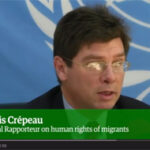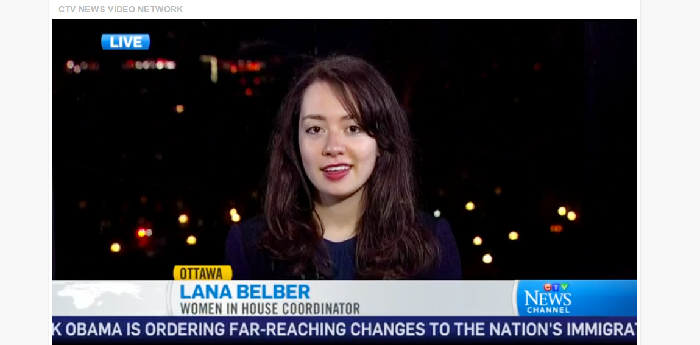In November, several faculty members penned op-eds in and spoke to the Canadian press on a variety of critical legal matters. Doctoral candidate Stefanie Carsley wrote an OpEd on the IVF limitations in Quebec’s Bill 20. First-year Law student Lana Belber was also featured in the press, speaking to CTV about a Parliament-Hill initiative she leads that encourages young women to become active in political life.
Excerpts and links to the original articles and interviews, below.
Israel should make its case in the International Criminal Court
René Provost
Montreal Gazette – Published on Friday, December 12
 Last month was yet another difficult one for Israel. In addition to the terrorist attack in Jerusalem that claimed the lives of four people praying in a synagogue and a police officer, the International Criminal Court (ICC) issued a decision concluding that the Israel Defence Force committed war crimes in the interception of the “Freedom Flotilla” in 2010 during which 10 Turkish citizens were killed.
Last month was yet another difficult one for Israel. In addition to the terrorist attack in Jerusalem that claimed the lives of four people praying in a synagogue and a police officer, the International Criminal Court (ICC) issued a decision concluding that the Israel Defence Force committed war crimes in the interception of the “Freedom Flotilla” in 2010 during which 10 Turkish citizens were killed.
Some will see continuity in the unfair targeting of Israel at the hands of terrorists and international institutions. It is time for Israel to act decidedly to disable these strategies, by moving this issue to a forum where justice is indeed possible.
The ICC prosecutor decided that the IDF interception did not warrant prosecution because it did not reach the level of gravity required for the ICC to intervene. However, surprisingly, the ICC prosecutor did conclude that the deaths were “probably” war crimes, and that Gaza was still legally considered occupied territory. This is a surprise, because these findings were not legally beyond dispute, in a process in which Israel took no part, but more fundamentally because they were not necessary, given the conclusion on gravity. [CONTINUE READING…]
Canada’s misguided approach to HIV
Canada’s use of the criminal law to punish HIV-positive individuals who do not disclose their status to sexual partners is particularly harsh.
 Robert Leckey
Robert Leckey
The Star – Published on Sunday November 30, 2014
EXCERPT: “World Aids Day, on Dec. 1, gives us cause to rejoice and to lament. In Canada and other countries with robust public health care, HIV is now a manageable chronic condition rather than a death sentence, as it remains for millions elsewhere. But Canada’s use of the criminal law to punish HIV-positive individuals who do not disclose their status to sexual partners is particularly expansive and harsh. Its approach undermines basic messages of public health and ignores the diversity of sexual practices.
Canada’s punitive approach comes courtesy of aggressive prosecutors and the Supreme Court of Canada. It treats not disclosing HIV-positive status as negating consent to sex, equating it to rape under the law. Even where the accused never transmits the virus or where there was minimal risk of transmission, this approach can lead to imprisonment and lifetime designation as a sex offender.
The current legal approach essentially invites individuals who are HIV-negative to assume that sex is safe. It encourages them to have unprotected sex with people whose HIV status they don’t know and don’t ask about. After all, the judges and prosecutors tell us, the criminal law obliges your partner to tell you if he or she has HIV.” [CONTINUE READING…]
Trust and collaboration needed to help J.J.
 Shauna Van Praagh
Shauna Van Praagh
The Ottawa Citizen, published on November 21, 2014
EXCERPT: “J.J., an eleven-year-old girl from the Six Nations of the Grand River reserve, is living with acute lymphoblastic leukemia. Her doctors at McMaster Children’s Hospital have told her and her mother that chemotherapy would give her a better than 90% chance of beating the disease. Without it, she will probably die before she hits her teenage years. This past week, Justice Gethin Edward refused to order the child into protection and treatment on the basis of constitutional recognition of the aboriginal rights of J.J.’s mother.
This is a tragic story; anyone hearing it must feel true empathy for J.J.’s mother, family, and community, and for this young girl herself. But it is not a simple story. Appreciating its complexities points to the sharing of responsibility for J.J.’s future.
One way to present J.J.’s story is as a choice between life and death. But cases like this – when parents refuse medical treatment for an ill child – are never easy. When a court makes a young child a ward of the state for the purposes of forcing life-saving treatment against the wishes of her parents, we sometimes forget that those same parents are often trying to do what they believe is most supportive for a child they love. J.J.’s mother may not want to relinquish decision-making to a physician or judge, but that doesn’t mean she doesn’t want to save her daughter.” [CONTINUE READING…]
The ethics of egg freezing
 Margaret Somerville
Margaret Somerville
National Post, published on November 17, 2014
EXCERPT: “Apple’s and Facebook’s announcement last month that they would offer $20,000 health insurance coverage to women employees to cover the cost of freezing and storing their eggs, to enable them to postpone child-bearing and keep working, elicited a rush of commentary and debate. But only now are the full ethical ramifications of this proposal becoming fully clear.
Egg or ovarian tissue freezing can be used for medical or social reasons. Medical use — for example, freezing tissue from a young woman who might become infertile because of cancer treatment so she can later have her own children — does not raise the same ethical issues as social use, the issue I address here.
Many younger women journalists who called me opened our conversation saying they were at an age when they were thinking of having a baby and they felt very disturbed by this story, but were not sure why. A common comment was “It [egg freezing] just doesn’t seem right.” Their reaction is probably an example of the “ethical yuck factor” — we intuit that something is ethically wrong, but need time to explore the matter to identify the nature of that wrong.” [CONTINUE READING…]
Dénonciations : quelques distinctions s’imposent
Robert Leckey
La Presse, publié le 12 novembre 2014
EXCERPT: “Une ancienne étudiante en droit sait que je m’intéresse aux questions du genre, d’égalité et des droits fondamentaux. Que pensez-vous, me demande-t-elle, de la campagne #AgressionNonDénoncée et des événements reliés ? C’est compliqué, je lui réponds. Nous nous entendons : il s’agit d’un sujet délicat à aborder et un débat de société s’impose. Avouons que les enjeux dépassent de loin le ressort des avocats. Essayons de placer quelques jalons d’analyse et de faire quelques distinctions cruciales.
Se réjouir que les femmes brisent le silence n’équivaut pas à dire que tous les silences sont les mêmes. Tous les gestes de briser le silence ne le sont pas non plus. Une gamme de comportements inacceptables peut découler de l’appareil du pouvoir masculin. Les gestes qui disent aux femmes qu’elles sont de second rang dans un lieu de travail ont cela en commun.
Toutefois, il y a des distinctions à tracer entre le harcèlement et le viol. Dire que plusieurs sont coupables, ce n’est pas dire qu’il n’y a pas de degrés de culpabilité. Certains reportages passent de l’un à l’autre, sans en souligner les différences. On a tort de le faire. Cela risque de banaliser les méfaits les plus graves.” [LISEZ LA SUITE…]
We condemn attacks on women at work, unless it’s sex work
 Angela Campbell
Angela Campbell
The Globe and Mail, published on November 11, 2014
EXCERPT: “In a fortnight marked by intense media focus on sexual assault and harassment in the workplace, another news item – also bearing deep-seated gender implications – has moved far more discretely through the Canadian public circuit. Bill C-36, the federal government’s proposed new law to govern sex work, passed through Senate last week, and is now set to receive royal assent. This will be the final step in the legislative process before the bill becomes a new law.
This latest development in the trajectory of Bill C-36 occurred largely under the public radar. The story was obscured by scandals serving to illuminate how sex can be used to intimidate or harass women at work. This is true even when women hold jobs in prominent public places, like national media outlets, or Parliament Hill.
Bill C-36, and the various steps in its progression, could have offered similar insights about sexual dignity and security at work. But that was a missed moment. The Supreme Court decision that led to the bill’s inception told us that criminalizing sex work exposes sex workers to unsustainable threats and dangers. Prohibitions push those who take part in the sex trade to social and geographic margins, where preventing or seeking redress for violence and abuse is impossible. As such, the Court found these prohibitions to be unconstitutional.” [CONTINUE READING…]
How a gene-patent test case will help both patients and inventors
 E. Richard Gold, with Sam Abraham and David Castle
E. Richard Gold, with Sam Abraham and David Castle
The Globe and Mail, published November 4, 2014
“Canadian prosperity depends on our ability to innovate. When it comes to unlocking the power and mysteries of genomic medicine, our competitors in the United States now have free reign – but Canadian innovators continue to be shackled.
The Children’s Hospital of Eastern Ontario (CHEO) launched a test caseagainst human gene patents on Monday. The primary objective of the case is to ensure that CHEO patients – children with a potentially lethal yet often otherwise undetectable disease – receive the health care they need. A parallel objective of the case is to address long-standing problems with gene patents that hamper rather than enable innovators.
Patents enable innovative firms to bring a new health product or service to market and reward that effort with 20 years of reduced competition. Leaving aside generic criticisms of patents, not all patents are created equally or have the same effects on innovation. Patents over natural gene sequences and over basic genetic tests not only lessen patient access to health care but prevent innovators from developing the next generation of tests needed to better predict the onset of disease.” [CONTINUE READING…]
‘Do not stop the boats,’ says [François Crépeau,] UN envoy on migrants
 In 2013, 51.2 million fled their homes due to war, persecution and human rights violations
In 2013, 51.2 million fled their homes due to war, persecution and human rights violations
By Tanya Talaga, Staff Reporter
The Star, published on November 21, 2014
EXCERPT: The top UN envoy for migrants has this advice for European nations faced with boatloads of desperate refugees fleeing war-torn countries: Let the boats come.
Jailing adult or child migrants in detention centres, stopping boats from landing and building sky-high walls along borders are not lasting solutions to the world’s migrant crisis, says François Crépeau, the United Nations Special Rapporteur on the Human Rights of Migrants.
Last year, 51.2 million people fled their homes due to war, persecution and human rights violations — the largest number since the Second World War. For the last few weeks, the Star series “Flight of Their Lives,” has reported on the plight of unaccompanied child migrants who make unimaginable journeys alone, looking for a better life. [CONTINUE READING…]
What problem is Quebec’s IVF bill trying to solve?
By Stefanie Carsley, DCL candidate
The Globe and Mail, published on December 9, 2014
 Discussions surrounding Quebec’s proposed reforms to its laws relating to assisted procreation have focused on its decision to eliminate its program of funding three cycles of in vitro fertilization (IVF). But this narrow focus ignores other significant changes in Bill 20: notably, its decision to prohibit women over the age of 42 from using IVF and the requirement that Quebeckers using donated sperm or eggs undergo a psychosocial assessment prior to accessing treatment.
Discussions surrounding Quebec’s proposed reforms to its laws relating to assisted procreation have focused on its decision to eliminate its program of funding three cycles of in vitro fertilization (IVF). But this narrow focus ignores other significant changes in Bill 20: notably, its decision to prohibit women over the age of 42 from using IVF and the requirement that Quebeckers using donated sperm or eggs undergo a psychosocial assessment prior to accessing treatment.
These new laws draw distinctions between Quebeckers on the basis of their age and whether parents will have a genetic connection to their children. The government has also advanced these changes without explaining the differential treatment they propose.
Quebec law currently states that anyone of “childbearing age” – i.e. pre-menopause – can use IVF. Bill 20 would prohibit any woman over the age of 42 from accessing IVF and physicians who treat women above this age could be fined $5,000 to $50,000. Importantly, this restriction and the associated penalties would apply even though the government would no longer be paying for IVF treatment, but would instead be offering a tax credit. [CONTINUE READING…]
Students Shadow Women Politicians in House of Commons
First-year student Lana Belber coordinated the Women in House Program at McGill, for which nearly 40 outstanding McGill students visited Parliament and shadowed female politicians on the Hill for two days. Belber spoke to CTV news and explained that women can help change the adversarial nature of the House of Commons.
The Women in House program has encouraged young women to become active in political life by giving female students the opportunity to meet with political leaders and learn about the Canadian political system since 2001.
[ JUMP TO THE CURRENT EDITION OF FOCUS ONLINE ]

